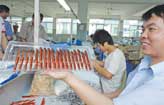NEW YORK - On Friday, the small-town Texas drama "Friday Night Lights" will end its five-season run as one of the finest, most humanistic shows on television.
Though never a ratings success, the show gradually found a fervent following. Shot on location around Austin, Texas, and in a collaborative and improvisational style, "FNL" will be particularly remembered for its naturalism.
Instead of elaborate sets and rigid blocking, scenes were typically captured by three cameras following the action of the many characters of Dillon, a football-obsessed town anchored by the moral centers of coach Eric Taylor (Kyle Chandler) and guidance counselor Tami Taylor (Connie Britton).
On a show largely about community, the making of "FNL," too, was a kind of community. Though much of the cast came and went throughout the show's run as characters graduated from high school and moved on, "FNL" was its own family.
The final season already aired on DirecTV, so the NBC finale Friday (8 p.m. EDT) comes nearly a year after "FNL" wrapped.
To mark the end, the cast and creators of "Friday Night Lights" talk about their experience with the show: Britton; Taylor Kitsch (Tim Riggins); Michael B. Jordan (Vince Howard); Zach Gilford (Matt Saracen); Jason Katims, executive producer; and Peter Berg, creator and executive producer.
With clear eyes and full hearts, they reflect on "Friday Night Lights."
KATIMS: One of the early episodes, we were shooting in a Baptist church. ... Everybody in the place was effectively part of the community: the congregation, an organ player, singers, a minister. I was up there in the church talking to the minister when we were getting set up to shoot. ... And then suddenly, without anyone ever calling action, the musicians started playing and the congregation started getting into it. It very naturally was happening. The (assistant director) screamed out, "Hey Jason, you're in the shot!" They just started shooting. And that's very typical of the way "Friday Night Lights" worked. Nobody called "action," nobody told the background what they should be doing.
KITSCH: I based a lot of Riggins' look off of Gary Oldman in "State of Grace." His long hair, his grease. On the pilot and once we got picked up, I'm sitting in the make-up and hair (department) and I'm like, "Nope, more. Nope, more." They were like, "Really? Are you serious?" And I was like, "Yes. This cat, this is who he is." It became this whole over-exposed deal about his hair.
JORDAN: One of the first people I met down there was Brad Leland (Buddy Garrity). I walked into a Mexican restaurant and I went over and introduced myself to him. I said, "You might not know who I am, but I'm playing x, y, z on the show." He said, "Michael. Michael, listen to me, Michael. This is something that you'll never, ever, ever forget. You're part of something special. And you just wait until you go to set on Monday and you'll find out for yourself, because I can't tell it with any justice." That was the first welcoming I got and he didn't speak one false word. Everything he said was true.
BRITTON: I have this one memory, it was in season one and we were shooting the last episodes where Tami finds out she's pregnant and we're in the championship game. There's a whole story about how we're going to go about dealing with the pregnancy. We were shooting in a hotel room and Jeff Reiner was directing. I just remember us all lolling around on the beds in the hotel room, talking about how these scenes should play out and what would make the most sense for these characters in the moment. ... I always think back on that because there was such a sense of comfort about it. ... We could sit around and talk about what was happening in these people's lives for hours.
BERG: My memories of "FNL" will forever be joyful: West Texas sunsets; (football drills) Bull in the Ring, Two-A-Days in 115 degrees; (real life inspirations for the show) David Edwards and the Austin Westlake Chaparrals; Mack Brown (University of Texas head coach), Vince Young (former Texas quarterback), Boobie Miles (primary subject of Buzz Bissinger's book "Friday Night Lights: A Town, A Team, and a Dream") are forever a part of my heart — which is full, as my eyes are clear.
KITSCH: I don't think I'll ever forget playing (Riggins). For me, I loved reconnecting, coming back. It was just this really safe zone where we could come in and take silly risks and just get after it. I had so much fun doing that. ... I miss the process. ... And just the freedom. Literally, I'd go to set and they'd be like, "Let's see what the actors brought to it and then position it." That's the beauty we had. It makes you better when you give someone freedom or an opportunity.
KATIMS: There was one day where we were shooting some practice scenes on the football field. But we weren't shooting yet, we were just setting up and waiting for people to come. And Taylor Kitsch was walking up in his uniform just starting his day. Jeff (Reiner) the director got one of the camera operators to start filming him and told one of the assistant coaches to run up to Kitsch and just start screaming at him for being late. Taylor Kitsch wasn't working yet, he was literally just walking to the set and suddenly he's being bombarded by this coach.
GILFORD: I will never forget a scene in episode eight of season one when Herc (Kevin Rankin) and Street (Scott Porter) race through the halls of the rehab facility in their wheel chairs and eventually knock each other onto the floor. When Street asks what they do now, Herc replies, "We yell for help," and the two lay there screaming for help. This scene always seemed to epitomize our show for me. Not many TV shows will show two kids fall out of their wheel chairs onto the floor unless it is followed by some melodramatic moment where they beat the odds and climb back into their chairs. We showed what happens in real life. They laid there and asked and waited for help. This scene has stuck with me since the first time I watched it and I think it is one of the most beautiful we ever had on the show.
JORDAN: The first scene that I had with my dad, Cress Williams, is the first time that I met him. ... It was electric. It was so organic and so real that every time I see those scenes, I get goose bumps and I can't watch it all. It was such an emotional, real moment. That's what "Friday Night Lights" is all about. We put actors and characters in certain situations that will produce the most organic moments, the most real TV moments.
KATIMS: The night that we had the wrap party, it was getting to be toward the end of the evening and somebody came up to me with the idea to go to the field. A bunch of us, 15 or 20 people, went from the party to the field, put the lights on and played touch football. It was such a great moment. Some of the actors, some crew members, a couple of the writers and editors. It was like life imitating art.
BRITTON: It's been almost a year, and I still miss it. It's still sort of getting used to life without "Friday Night Lights." It was such great experience and such a unique one. I feel like my life was forever changed by it.
KATIMS: The show radically altered my idea of making television, what television could be.



